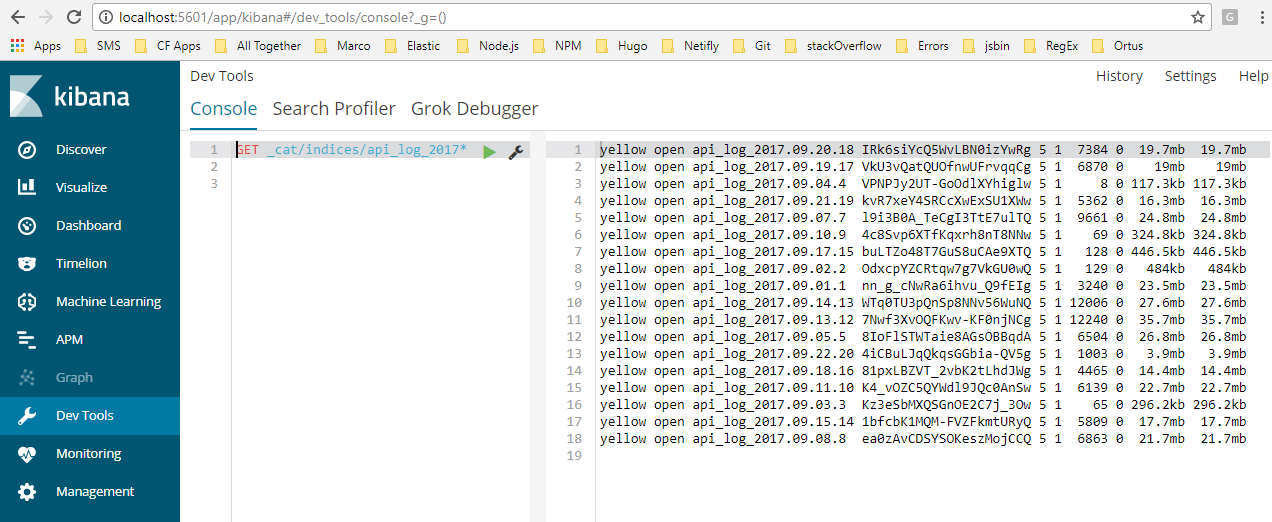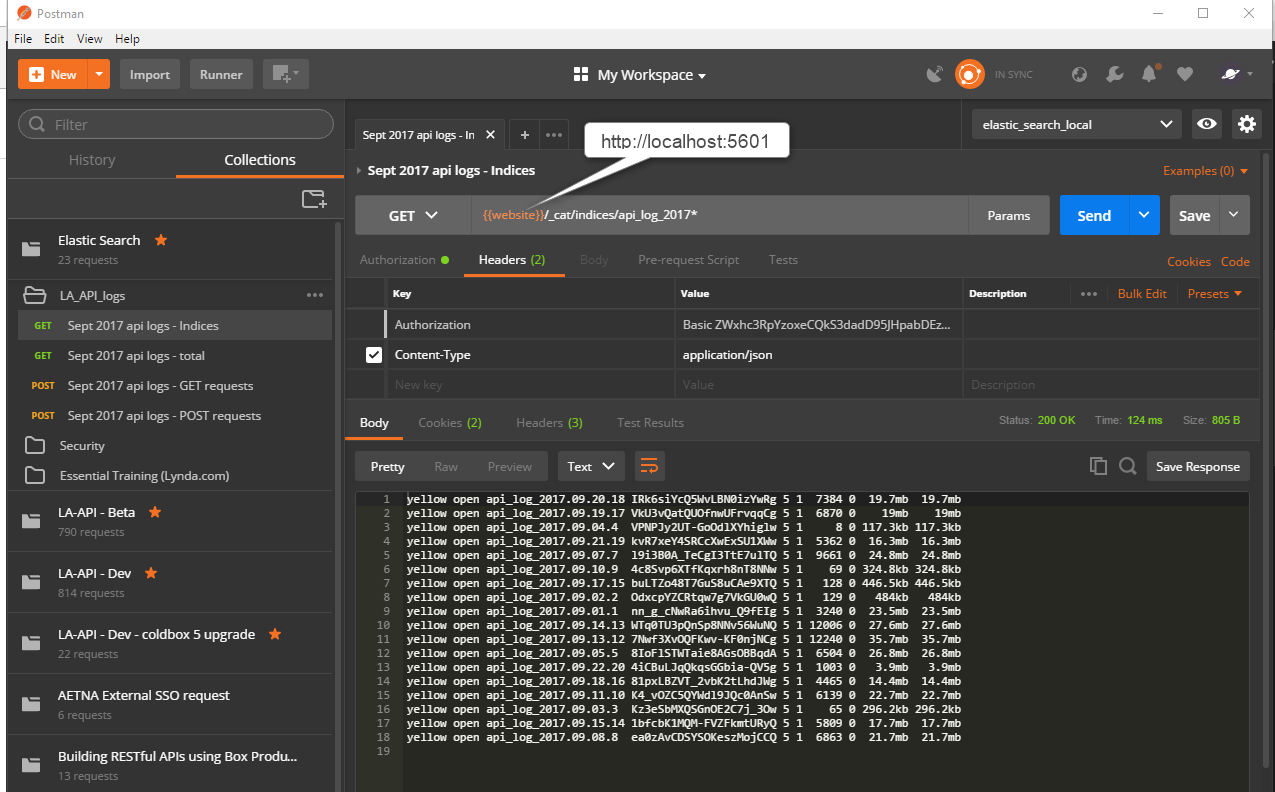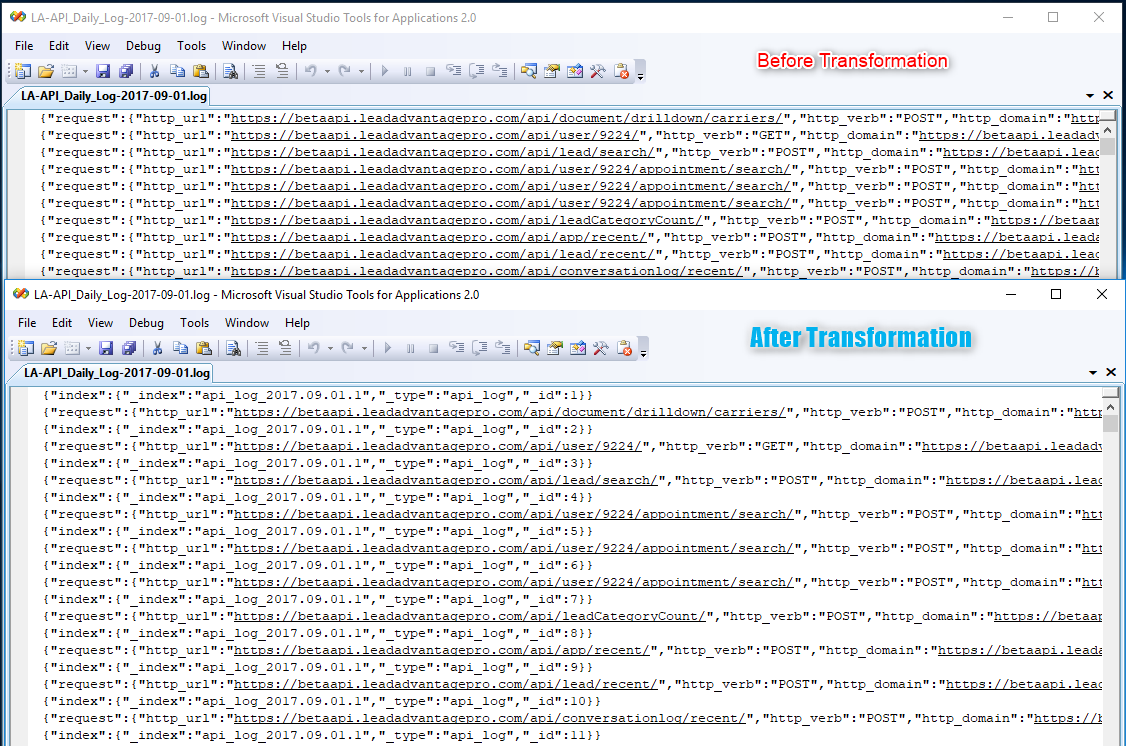Simple utility that reads LA-API daily logs, converts them into Elastic Search format and Bulk Upload them to the Elastic Search server. The logs can be manage through the Kibana console with the option of creating visualization graphics that can be integrated in a Dashboard interface.
You need to have a recent version of Java installed. See the Setup page for more information.
Elastic Search
- Download and unzip the Elasticsearch official distribution.
Kibana
- Download and unzip the Kibana official distribution.
- Clone this repo
- Run npm install
- Run bin/elasticsearch on unix, or bin\elasticsearch.bat on windows.
- Run bin/kibana on unix, or bin\kibana.bat on windows.
- Go to the Help menu usage section to learn more about running the app with command line arguments
Call the help menu in command line interface:
$ node input -h
Usage: input -f [input JSON file] -i [Elasticsearch index to write to] -t
[Elasticsearch type to write]
Options:
--version Show version number [boolean]
-f, --filePath Path to input JSON file [required]
-i, --indexPrefix Elasticsearch index prefix [default: "api_log_"]
-t, --logType Elasticsearch type name [default: "api_log"]
-h, --help Show help [boolean]
Examples:
1. node input --f C:/LA-API-logs/dailyLogs/2017/09-Sep
2. node input --f C:/LA-API-logs/dailyLogs/2017/09-Sep --i myindex_ --t mylog
NOTE: ElasticSearch names for indexPrefix and logType should be in lower case
Using Postman or the Kibana interface, perform a call against the api_log index pattern to verify that upload was successful
Daily log files are written using the jsonl format - each line on the file represents a fully valid JSON object.
Daily log files are placed in the location specified by settings.fileLogPath in the coldbox.cfc (e.g. C:\LA-API-logs\dailyLogs)
Find daily log files organized by year, month and day. example:
dailyLogs
| --- 2018
|--- 01-Jan
|--- LA-API_Daily_Log-2018-01-01.log
|--- LA-API_Daily_Log-2018-01-02.log
If you want to load logs from a remote server, download the .log file to a local directory on your machine.
In order to load log data in bulk into elasticsearch, you must first tell elasticsearch where to load the data in the files. This is done by including a header row before each row to upload which communicates this information to elasticsearch.
- Process flow:
input.js --> applyHeaders.js --> esUpload.sh --> ElasticSearch server
- Example of index header row:
{"_index":"LA-API_Daily_Logs-2017.09.01","_type":"api_log", "_id":"1"}Fields:
- _index - this identifies the collection to upload the record (e.g. jsonl line) to
- _type - tells elastic search how to map the data in the json file to fields in the elasticsearch index
- _id - UNIQUE id for the record - must be unique within a given elasticsearch index
Use the applyHeaders.js file to process a log and apply the appropiate header records for each logged row.
- Processes the log file(s) to resolve/replace any data that will cause problems when trying to import into elasticsearch
// applyHeaders.js
// Process log file line-by-line
rd.on('line', function(line) {
count++;
// Create header text
header = JSON.stringify({ "index":{"_index":myIndexName,"_type":logType, "_id": count } });
// Transform Invalid Data/Structures into ElasticSearch Friendly Format *******************
// Stringify the contents of http_body
objJSONLine = JSON.parse(line);
objJSONLine.request.http_body = JSON.stringify(objJSONLine.request.http_body);
objJSONLine.response.http_body = JSON.stringify(objJSONLine.response.http_body);
// Output results to buffer so it can be captured and saved into new file
console.log(header);
console.log(JSON.stringify(objJSONLine));
});Once the logs have been processed and appropriate header records created, you will need to run statements like the ones in esUpload.sh file in order to upload the data into elastic search
example:
# esUpload.sh
# process raw file into version that includes headers
node input.js PATH_TO_RAW_LOG_FILE.log > PATH_TO_PROCESSED_FILE_WITH_HEADERS.log
# transmit the processed file to elasticsearch
curl -H 'Content-Type: application/x-ndjson' -XPOST 'YOUR_SERVER:YOUR_PORT/_bulk?pretty' --data-binary @PATH_TO_PROCESSED_FILE_WITH_HEADERS.log


